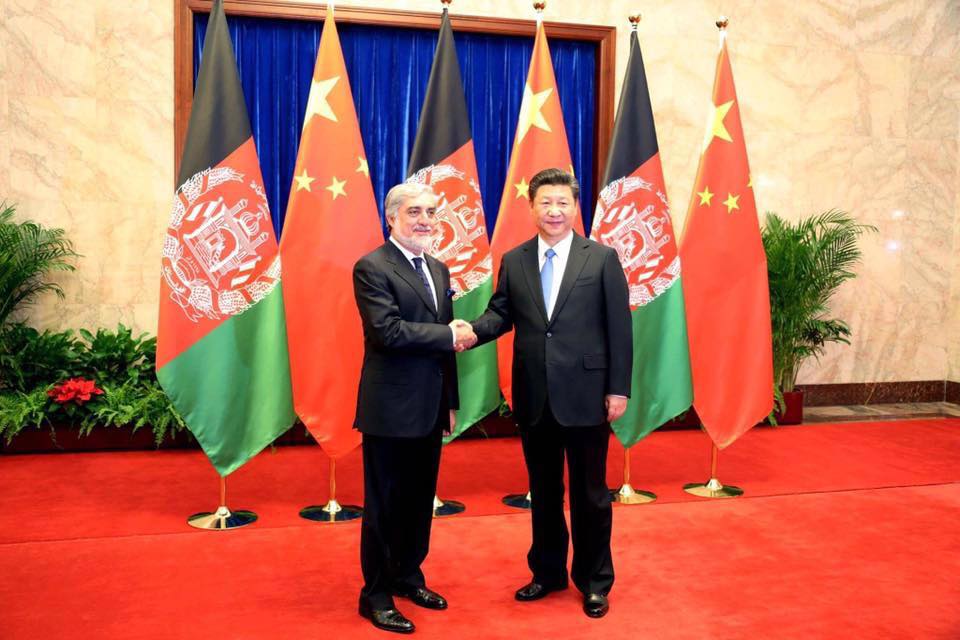Kabul-Beijing ties and the New Silk Road
The Afghan Chief Executive Officer (CEO) Dr. Abdullah Abdullah went to china on an official invitation by Chinese Prime Minister. The trip occurs at a time that on the one hand, Pakistani Chief of Army Staff General Raheel Sharif is also in China and on the other hand, the fifth meeting of QCG was held in Islamabad.
In this trip, six agreements were signed between the two countries inthe fields of transit, trade, economy, and cultivation,the most important of which was the agreement of the New Silk Road.
what will be the impacts of this trip on China-Afghanistan relations and the reinitiating of the Afghan peace process andwill this trip make Afghanistan really part of “One Belt, One Road” economic belt of China, are the question which will be analyzed here.
The NUG and Kabul-Beijing ties
After the formation of the National Unity Government (NUG) in Afghanistan, the China-Afghanistan relations became much closer compared to the past years, becausethe Afghan President Ashraf Ghani began his foreign trips from China and also approached China for its peace strategy.
In 1394, the Afghan and Chinese officials increasingly visited each other’s countries and some Chinese Ministers, Chinese Vice President Li Yuanchao, and Chinese Chief of Military Staff came to Kabul.Besides that, Chinese Senior Officials also met Afghan Senior officials at the sidelines of some International Conferences (such as Shanghai Conference). The Chinese Officials also attended international conferences and meetings about Afghanistan (for instance, the Heart of Asia Conference-Islamabad, Quadrilateral Meetings between Afghanistan, Pakistan, the United States and China and Afghanistan, Pakistan and China Trilateral Meeting).
On the other hand, the Afghan CEO Dr. Abdullah Abdullah, the Afghan Foreign Minister SalahuddinRabbani and Afghan National Security Advisor Hanif Atmar also visited China.
In 1394, the China-Afghanistan bilateral relations wereimproving month after month and Kabul-Beijing relations were the only relations which was stable in the past one decade.Besides that, the Afghan-Chinese military cooperation also expanded and the Afghan National Security Advisor Hanif Atmar and Afghan Minister of Interior NoorulhaqOlomivisited China and signed four agreements in the fields of security according to one of which, China will plant security doors in the four gates of Kabul.
On the other hand, Chinese Chief of Army Staff General Fang Fenghui in an undeclared trip on February 29, 2016, came to Kabul and met Afghan Senior Officials.Besides promising 73 million dollars of financial aid to Afghanistanthe Chinese military chiefpresented Pakistan, Afghanistan, China and Tajikistan Anti-terrorism schemeand said that China will hold an international conference on Afghan President’s anti-terrorism plan in the upcoming summer. The Chinese military chief visited Afghanistan at a time that China’s two economic projects “One Belt, One Road” and “China-Pakistan economic corridor” were in the process of implementation.
Afghan CEO visits China
Due to official invitation by Chinese Prime Minister the Afghan CEO went on his second official trip to China on May 15. The three-day visit of Afghan CEO to China came at a time thatPakistani Chief of Army Staff Raheel Sharif also visited China and discussed the security of Pakistan-China Economic Zone.
The Afghan CEO once again demanded from Chinese Officials to reinitiate peace talks in China andput pressures on Pakistan.In response to a question in this regard the Afghan CEO said “we expect all leverages and influence to be used in order to security and peace to be maintained in Afghanistan”
In this trip the Afghan side cleared its position regarding China and expressed their support from China’s position in the South China Sea and signing six agreements in the areas of cultivation, trade and transit was an effort aimed at bringing the two nations closer.
According to these agreements, China will construct a building in the Kabul University;the saffron trade to China will start, Afghanistan will be provided with 500 million yuan technical and 50 million yuan human support, and also Afghanistan will become part of the “One Belt, One Road” economic belt.
New Silk Road
In 2013, when power in China was transferred from fourth generation to fifth generation; Xi Jinping became Chinese President. While China’s economic development was devastating, Xi Jinping came with major economic schemes and took measures to implement them. One of these schemes was the revival of Silk Road (New Silk Road).
New Silk Road will go through two paths, one, through land and second through sea.
The land-based “New Silk Road” will begin from China, and it will reach to Europe and Middle East through Central Asia and Iran. Afghanistan was trying to be part of this road since ever the beginning and now has inked the agreement of “One Belt, One Road” with China.
This agreement which includes Afghanistan in “New Silk Road”can have positive impacts on Afghanistan.Because,based on this agreement, Afghanistan will change to regional trade and transit way andinvestments will be made on Afghanistan’s infrastructures (roads and railways) which will put multiple positive impacts on Afghanistan’s economy.

